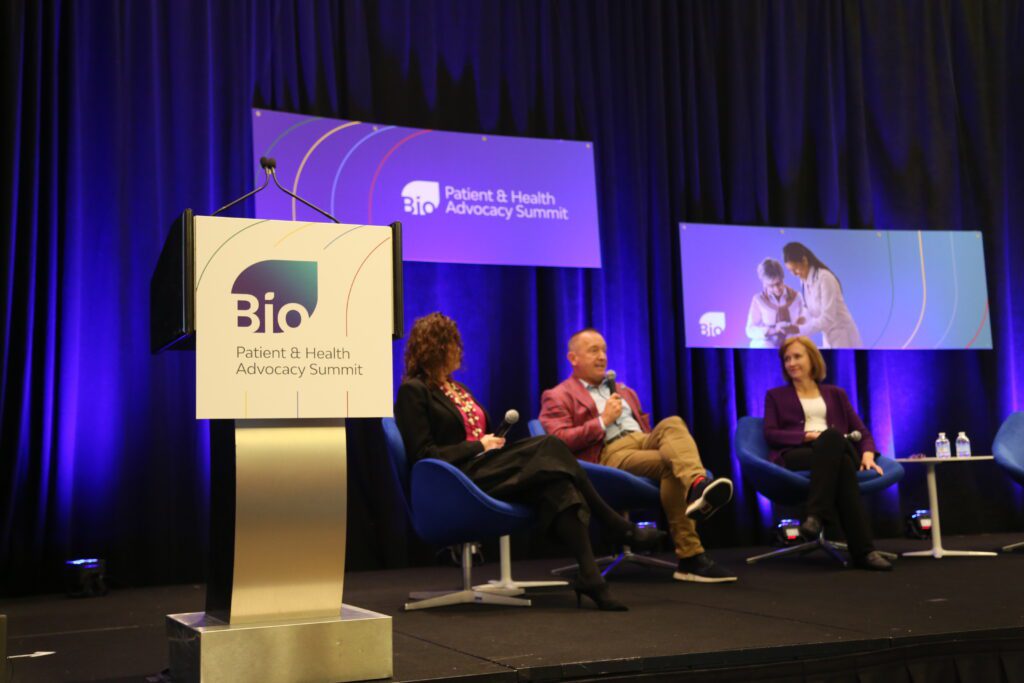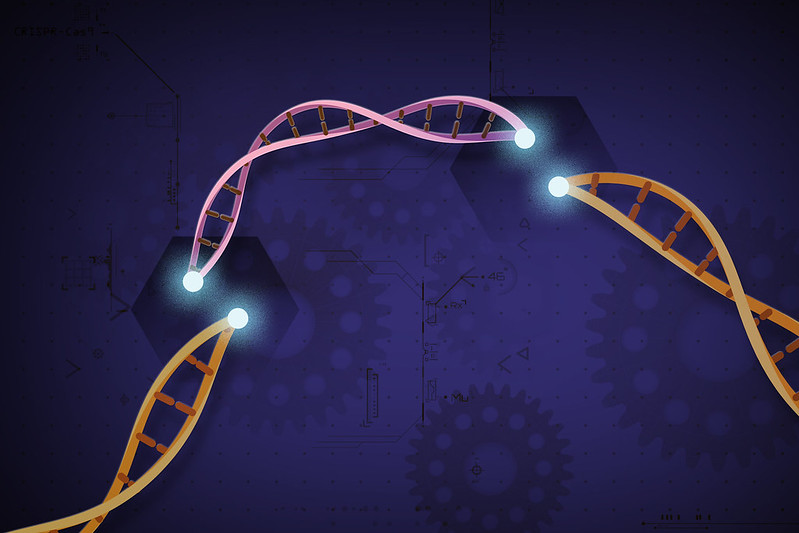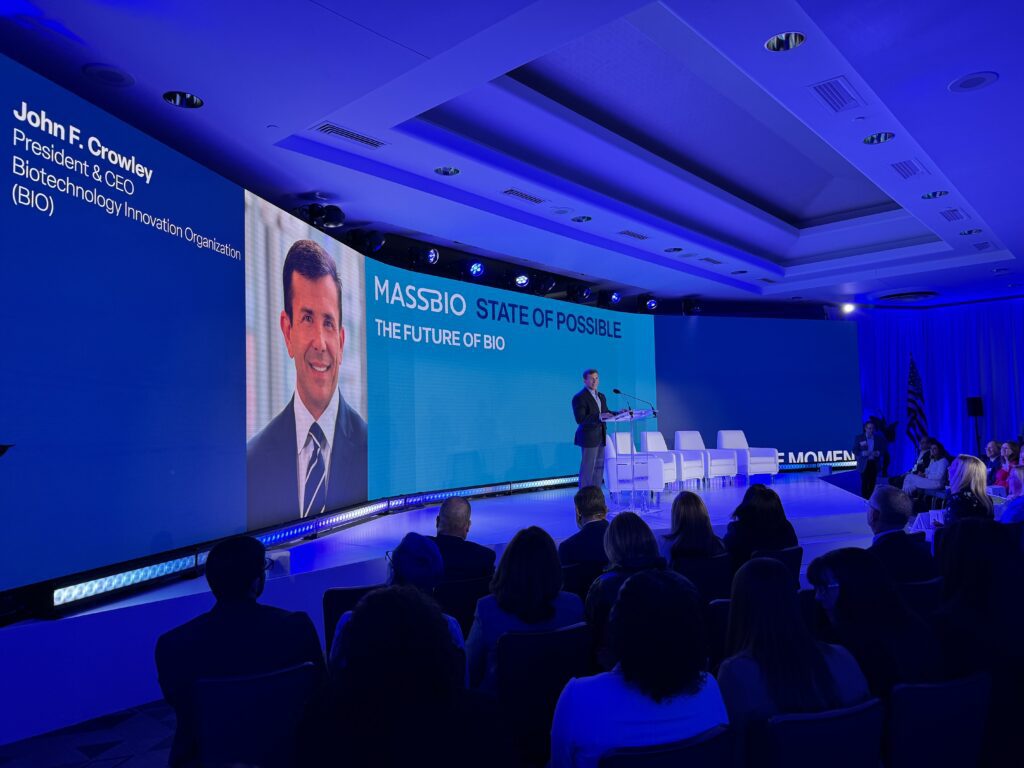The Biotechnology Innovation Organization (BIO) kicked off Day One of its two-day Patient and Health Advocacy Summit with a welcome from Eric Dube, President & CEO at Travere Therapeutics, Inc.
“The summit brings together distinguished leaders from patient advocacy organizations and the biopharmaceutical life sciences industry,” said Dube, who serves as Chair of BIO’s Patient Centricity and Advocacy Committee.
“The summit serves as a wonderful networking and learning opportunity. But more importantly, it allows us to connect on a personal level and focus on what matters most: helping to improve the health and well-being of patients and to celebrate your leadership in serving your respective patient communities,” he continued.
Embracing ‘eccentricity’
“This is your day,” asserted Paul Hastings, CEO at Nkarta Therapeutics and Chair of BIO’s Board. “The best patient advocacy summits we’ve had are the ones where participants aren’t just patient-centric, their patient-eccentric. So let those eccentricities come out today.”
Hasting’s welcome drove home the patient advocacy summit’s primary theme: patient-centric leadership. It is a focus that is built from participants’ personal experiences, as well as the careers-long relationships that they have built with their patients.
“I was diagnosed with Crohn’s disease at the age of 13,” Hastings explained. “So until 19, I lived with severe Crohn’s and experienced the horrors of living with that disease before we had wonderful drugs like the ones we have today. At 19, I decided to have surgery, which allowed me to live disease-free on the surface. Though underneath it all, I still have Crohn’s. But I woke up from my life-changing surgery hungry.”
“After the surgery, the nurses I had befriended asked me to come to the local college of nursing and speak to a class about going through this kind of surgery at 19 years old,” he continued. “That was the start of a long career as a patient advocate.”
Welcoming King as interim CEO


“This is actually my first week on the job,” said King. “Furthermore, this is my first conference in my first week on the job. And so I think it’s really appropriate that it would be here with patients because you are the heart of what we’re doing.”
“Patient stories in terms of the patient journey help drug developers really understand what is important to patients, and therefore what kind of things we should be evaluating in clinical trials,” she continued. “As companies, we need to think about what questions [we] should be asking. How should we be evaluating?”
The answer is that to develop a pathway for approval we have to work together with our patients. We have to define those pathways by understanding what the patient experiences in order to be able to appropriately figure out how to address treatment in a meaningful way,” she noted.
Patient advocacy summit highlights importance of patients’ stories
“I want to encourage everybody to constantly not be afraid to speak your mind,” Hastings reminded participants before the panel launched into a spirited discussion that covered navigating a hyper-partisan political landscape and faltering public confidence in science, among other topics.
“The Hill is so much more partisan now,” reflected King. “Which is really difficult. It was my sincere feeling when I came into my policy position with Novartis—and still is today—that there are good people who want to do the right thing for this country on both sides of the aisle, and we need to find a way to work together.”
Unfortunately, political partisanship seems to go hand-in-hand with the overwhelming anti-science rhetoric that the country faces. “I would say that we don’t see the confidence in science that I would have liked to have developed by now,” said King. “However, when we think about the biotechnology industry, we have actually delivered in terms of materials. I’m surprised and disappointed that we haven’t seen a concurrent evolution and development of confidence, particularly around the vaccine situation, during the pandemic, for example.”
Yet, patient advocacy offers a solution when it comes to tackling issues of partisanship and anti-science sentiment.
“Talking about science in the abstract does not tell our story,” said King. “What tells our story is when we can talk about the specific benefits of what scientific innovation has achieved and that means sharing the stories about our patients.”
Hastings echoed this sentiment, recalling, “As someone who is part of the LGBTQ community and who works with an advocacy organization for LGBTQ professionals, I can tell you that we have all been vaccinated with the monkeypox vaccine now two or three times,” he continued. “We are a population that understands when science saves us from death. It is much easier to understand that power of science when you still remember just how imperative it has been in saving lives in your recent history.”
“Everything comes back to access to healthcare. The most important thing to remember is that every human being has a fundamental right to be able to access healthcare in an affordable way and in an easily accessible way.” – @phastings14 #BioPatientSummit22 pic.twitter.com/qFYmKeEVAi
— I Am Biotech (@IAmBiotech) October 27, 2022
The ups and downs of advocacy
“All of us with chronic diseases know that you rise from the ashes like a phoenix every few months every time our cycle of disease comes and goes,” mused Hastings. “It is important for us as advocates to remember that, similarly, when we get knocked down, even though it’s not easy, we can always get back up again.”
“I’ve seen every up and every down that you can see in biotech after all the years that I’ve been doing this,” said King. “But I have always had a consistent feeling of excitement around the opportunity to make a difference in people’s lives. My love of biology and my desire to do something that would help be impactful makes this a great field to be in and working in biotechnology is the most meaningful way that I could think up to spend my career.”
Hastings summed up the sentiment of the day in one sentence: “Everything comes back to access to healthcare.”
“The most important thing to remember is that, no matter what,” he concluded, “every human being has a fundamental right to be able to access healthcare in an affordable way and in an easily accessible way.”




